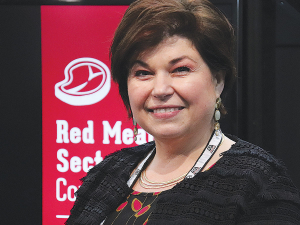Santa's present for the primary sector - an FTA with India
Primary sector leaders have welcomed the announcement of a Free Trade Agreement between India and New Zealand.
 MIA boss Sirma Karapeeva struggles to see how much more automation can be introduced into the meat industry to resolve the present labour shortages.
MIA boss Sirma Karapeeva struggles to see how much more automation can be introduced into the meat industry to resolve the present labour shortages.
Meat Industry Association (MIA) boss Sirma Karapeeva says she struggles to see how much more automation can be introduced into the meat industry to resolve the present labour shortages.
Karapeeva says many people seem to think that automation is the silver bullet that can compensate for labour shortages in the industry caused by the Covid-19 pandemic.
"I struggle to see how that is possible. In the red meat sector, we have already done all that we can do in terms of the lower hanging fruit in automation," she told Rural News.
"The big pieces of automation are already in place and the next areas of automation that could be developed are really challenging because you are dealing with the natural product - meat."
Karapeeva says while it's possible to cut out a widget based on a computer program, it is much more complicated to get a computer to cut a product such as meat. She says there may be an opportunity in the future, but at the moment the industry is having to focus on the immediate labour shortages and can't buy into the idea of further automation.
She also notes that innovation and automation are often confused, but in fact they are quite different things, with innovation often related to streamlining business processes within a company.
The issue that worries Karapeeva the most is that of labour shortages. She says this is the number one issue for the meat industry and she's grateful that the Government has rolled over the current visas for overseas workers for the next two years, which means that the crisis is not so imminent.
"But the idea of rolling over visas is not sustainable and does not give the companies the certainty to plan their production cycles," she adds. "We want to sit down with the Government and find a sustainable, long term solution that will give us certainty and will allow companies to plan."
Karapeeva points out that if the industry is unable to recruit halal slaughterers from overseas, it will devalue the carcass of the animal, impact on company profitability, reduce the value of NZ exports and affect returns to farmers.
Legal controls on the movement of fruits and vegetables are now in place in Auckland’s Mt Roskill suburb, says Biosecurity New Zealand Commissioner North Mike Inglis.
Arable growers worried that some weeds in their crops may have developed herbicide resistance can now get the suspected plants tested for free.
Fruit growers and exporters are worried following the discovery of a male Queensland fruit fly in Auckland this week.
Dairy prices have jumped in the overnight Global Dairy Trade (GDT) auction, breaking a five-month negative streak.
Alliance Group chief executive Willie Wiese is leaving the company after three years in the role.
A booklet produced in 2025 by the Rotoiti 15 trust, Department of Conservation and Scion – now part of the Bioeconomy Science Institute – aims to help people identify insect pests and diseases.